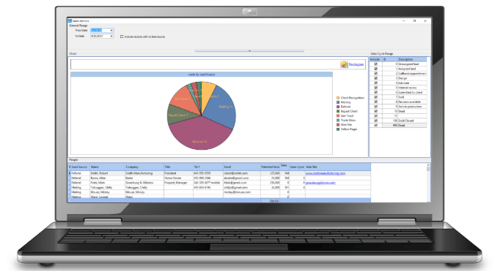 You have the freedom to choose how you wish to structure your landscaping sales commission rates and salaries. Of course, you want to choose a model that will work best for your company (and its profitability) while also motivating your landscaping salespeople to perform their best.
You have the freedom to choose how you wish to structure your landscaping sales commission rates and salaries. Of course, you want to choose a model that will work best for your company (and its profitability) while also motivating your landscaping salespeople to perform their best.
There’s obviously a lot at stake to set this up right. After all, you want to inspire your salespeople to work hard and sell more work while also attracting new, highly-motivated salespeople to your company. But you don’t want to overpay—or make payment errors—that could hurt your bottom line or disenfranchise your salespeople if they found out they somehow were compensated incorrectly.
We’ll explore some of the more common landscaping sales compensation models, rates, and tracking methods in order to help you determine what will work best for your business.
Landscape Sales Compensation Models
There are essentially four ways that you could be compensating your landscaping salesperson: 100-percent salary, salary plus bonuses, 100-percent commission, or salary plus commission.
Let’s take a look at each.
 Straight Salary
Straight Salary
Some people like the idea of knowing exactly how much they’re going to make in a year and therefore appreciate a straight salary. It will help them budget and plan for their future.
Of course, the downside to you is that they may not be terribly motivated to sell. As employees realize that they’re going to make the same amount whether they sell a lot of jobs or not, there isn’t a whole lot of incentive for them to work harder.
Salary Plus Bonuses (Hybrid Model)
With this model, your salesperson will receive a base salary. On top of that, they’ll have bonus goals tied to how much revenue (or profit dollars) they’re actually bringing into the business. This will incentivize your salespeople to bring in as much profit for the company as possible.
With a bonus model, you can also incentivize which services your salespeople are selling most. For instance, if your company is trying to grow its irrigation services, you could have separate bonuses tied to achieving certain levels of sales in that department. There are a lot of options.
Straight Commission
Generally speaking, commissions motivate your people to sell more, since they have something to motivate them. If you’re paying 100 percent commission, you’re going to naturally attract aggressive salespeople to the job and hopefully motivate them to do some serious selling.
But it’s also a big risk system. If they don’t sell, their income is going to take a big hit and sometimes factors against their control (such as the current economic marketplace) can hurt them. A landscaping sales commission model that is 100-percent based on sales might feel too risky for some.
You also have to worry about what type of salespeople may be attracted to a solely commission-based salary. They could be too aggressive to sell wisely, putting through jobs that are actually a bad sale for the company. If you are creating a salary that is heavily commission-based, you should have some stipulations tied to the gross profit of jobs to ensure your salespeople are estimating properly.
Salary Plus Commission (Hybrid Model)
In a salary plus commission model, salespeople have a base salary which gives them the security they may desire but also have the ability to earn more based on the number of jobs they sell. Since a landscaping sales commission model does reward for results, most landscape business owners feel that it helps motivate their people to sell more. Like a bonus structure, it motivates performance while still building company loyalty since it’s not making employees feel as though they’re out for an “all or none” experience—that they’re being supported by the company either way.
Of course, a landscape design sales commission and landscape maintenance sales commission can be quite different and you may want to keep that fact in mind as you create your structures.
Maintenance jobs may be sold more often but at a lower profit. This may make it better suited to a salary plus commission hybrid. You could structure it so that you’re paying different percentages for different services, even incentivizing new work differently from renewal commissions. Design/build jobs may be sold less often but could have more potential for profit, potentially making it a better fit for the salary plus bonus model.
Average Salary and Landscape Sales Commission Rates
 You might also be wondering how much should I pay my landscaping salesperson? Obviously, the numbers are going to vary based on factors such as credentials and experience, region, and even company role.
You might also be wondering how much should I pay my landscaping salesperson? Obviously, the numbers are going to vary based on factors such as credentials and experience, region, and even company role.
However, according to Glassdoor, a website where employees and former employees can review companies and share data anonymously, the national average for a landscape salesperson is $67,461. The national range in salary is $44,000 to $104,000.
In order to set a salary and landscaping sales commission that is appropriate for each of your salespeople, you must think about how much they stand to make for your company. You should base their salary upon a predetermined sales goal. Experts say that a landscape salesperson should be paid approximately 8 percent of what they sell, although this can be adjusted based on performance and the type of work your company specializes in.
When to Pay Landscaping Sales Commission
On top of how and what to pay, you might also be thinking about when to pay. You could pay upon sale, pay upon the job being billed, or not pay until your landscaping company has been paid by the client. While you obviously want to keep your salespeople motivated, you also don’t want to work yourself into a hole.
The risk of paying out commissions too early is that the job will fall through. Most landscape business experts advise not paying commissions until the job is completed and paid. Of course, this is data that must be closely tracked (which we’ll get to next).
Tracking Landscape Sales Commission
Ultimately, no matter how you choose to set up your commission structure, you’ll need to track it. Unfortunately, this is the hard part.
Why?
 It’s a lot of work if you don’t have the right tracking tools available.
It’s a lot of work if you don’t have the right tracking tools available.
While many accounting programs like QuickBooks can help you track commission, a simple software program like this is not going to be able to handle complex bonus incentives or relate everything back to gross profit the way that a more in-depth landscape business management software program could.
In addition, we have found that a lot of businesses are still using spreadsheets to track commissions. This is a problem for two key reasons: it’s time-consuming and it’s prone to error. Let’s look at each reason and how it may be hurting your business.
Using Spreadsheets to Track Commissions is Time-Consuming
A study performed by TechTarget, a marketing and technology company, found that respondents spent 12 hours every month “consolidating, modifying, and correcting spreadsheets.” This is valuable time that could be better spent on other areas of the business.
Using Spreadsheets to Track Commissions is also Prone to Error
Time spent aside, the bigger and more concerning reason you should not be using a spreadsheet to track landscaping sales commissions is the fact that it is prone to error. Actually, a recent analysis of multiple studies suggest that nearly 90 percent of spreadsheet documents contain errors.
Repetitive manual data entry is prone to human error such as entering the wrong number, accidentally deleting something, failing to save and update information, or even producing multiple versions of a spreadsheet with inconsistencies amongst them.
Tracking Landscape Sales Commission with Landscape Business Software
The smarter way to track landscape sales commission is with landscape business software. That’s because you can set up your numbers and not have to continually perform manual data entry for updates. While you can make changes to percentages or to the amounts paid, the number of errors declines when data cannot be easily changed or accidentally deleted like they can on Excel.
 Using landscape business software to track and pay commissions is also valuable because it allows you to look at the big picture. As we discussed previously when you pay a commission is an important factor in cash flow. Paying commissions too early can have the potential to hurt your cash flow. Say your salesperson sold a big job but the client never paid their deposit and the job will ultimately fall through. If you’ve already paid your salesperson their commission, you’re not going to ask for it back.
Using landscape business software to track and pay commissions is also valuable because it allows you to look at the big picture. As we discussed previously when you pay a commission is an important factor in cash flow. Paying commissions too early can have the potential to hurt your cash flow. Say your salesperson sold a big job but the client never paid their deposit and the job will ultimately fall through. If you’ve already paid your salesperson their commission, you’re not going to ask for it back.
By using landscape business software, you’re looking at not only which jobs have been sold but completed as well. If you’re a company that doesn’t pay commissions until the job has been fully paid, you can set it up so that you don’t accidentally pay your commissions too early and set yourself up for a problem if the job falls through. It’s much easier to keep track of all of that data, including the timeline of the work, when it’s all in one place. It’s a streamlined process for everyone.
With landscape business software tracking commissions, your salespeople could also be set up to check on their jobs, helping them keep track of where things stand and pushing those sold jobs through. Landscape salespeople could also receive commission reports which can be an excellent motivation tool for selling more. It helps your salespeople to gain confidence that no one is missing a single penny that they’ve earned. This allows them to focus on what they do best—selling—and not have to worry that they aren’t being paid properly for their hard work.
Finally, Be Sure to Develop a Written Policy
We would be remiss in not offering a word of advice about developing a written policy. There are a lot of decisions to be made when it comes to your landscaping sales salaries and commissions. Once you do have a structure in place, you should put it in writing. By ensuring your sales compensation plan is written and documented, you have something that can be distributed and enforced within your sales team. This can also serve as a meaningful motivator.
Simplifying the Process with the Best Support
 Sales compensation and tracking is yet another business task that can feel unnecessarily complicated without the right supports in place. But by using landscape business software to keep track of commissions (or bonuses), you can ensure that you’re paying employees in a timely manner that isn’t going to hurt your bottom line.
Sales compensation and tracking is yet another business task that can feel unnecessarily complicated without the right supports in place. But by using landscape business software to keep track of commissions (or bonuses), you can ensure that you’re paying employees in a timely manner that isn’t going to hurt your bottom line.
With Asset, you also have the ability to completely customize your compensation model. You can create unique bonus structures and incentivize your salespeople for very specific selling tasks. This allows you to do what is truly best for your company and not just what your software is capable of.
You’ll also eliminate human error and simplify the process of tracking this important data, which will save you time. And, your salespeople will have the opportunity to track their jobs and remain motivated to sell more work. It’s ultimately a win all around.
If you’re ready to see how landscape business software can help you better track landscaping sales compensation data, or you have questions that we can help with, then let’s explore and see what Asset can do for you.
Image Sources: Kingstowne Lawn & Landscape, Live Green Landscapes



